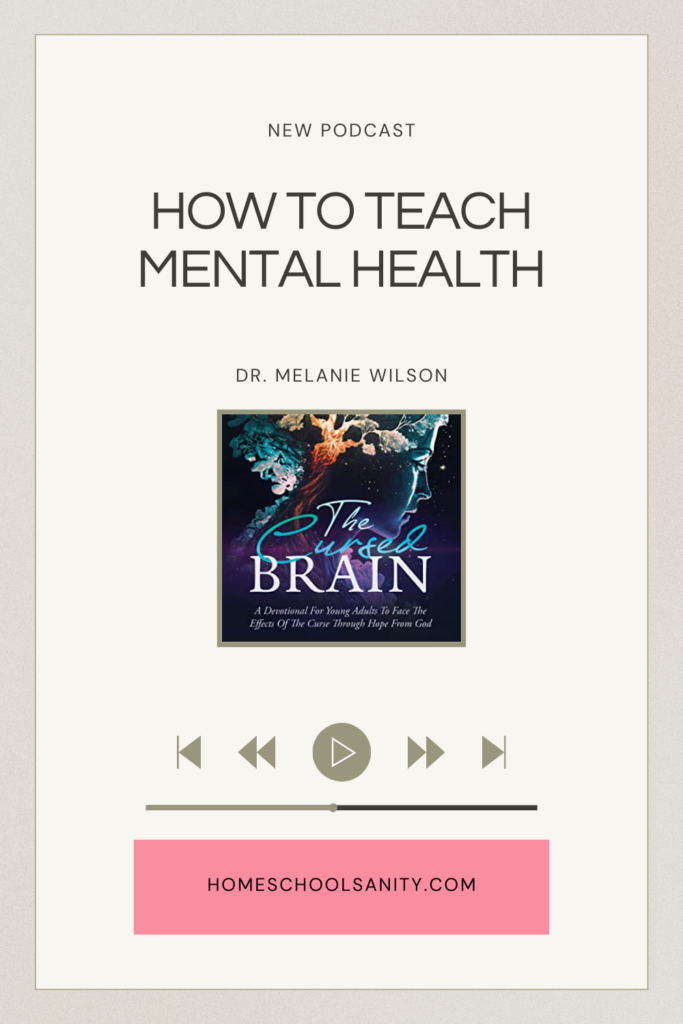
Homeschool encouragement and podcast
 Hey, homeschoolers! I intended to publish this episode last week but ended up giving you a chance to practice patience in waiting for it. I want to share what I’ve learned about being a patient mom, but first, I want to thank the Ultimate Homeschool Radio Network. They are celebrating their 10-year anniversary, which is amazing to me. I can’t believe it’s been that long since the kind and generous Felice Gerwitz offered me the chance to have my own podcast.
Hey, homeschoolers! I intended to publish this episode last week but ended up giving you a chance to practice patience in waiting for it. I want to share what I’ve learned about being a patient mom, but first, I want to thank the Ultimate Homeschool Radio Network. They are celebrating their 10-year anniversary, which is amazing to me. I can’t believe it’s been that long since the kind and generous Felice Gerwitz offered me the chance to have my own podcast.
Some weeks (like last week), it’s challenging to get the content out, but most of the time I love sharing encouragement with you, some of the most committed moms on the planet. The network has some special plans to mark our anniversary, so I hope you’ll check out the website or my social media to participate. Finally, I want to thank you for giving me the honor of listening to this podcast and other podcasts on the network. I don’t take it for granted.
Now let’s jump into the topic of the week: patience. I was surprised to learn that I haven’t done a podcast on this topic when a mom asked me for resources. I’ve done episodes on anger (Anger episode 2 Anger episode 1). But impatience is the precursor to anger. If we can manage our impatience, we are much less likely to lose our cool.
Just as with anger, I believe that only Jesus can rescue us from a real stronghold of impatience. That rescue usually isn’t immediate. When I started homeschooling, I learned I was an impatient mom. I had this image of what homeschooling would look like. My son didn’t share that image. My impatience in response was a nasty surprise. Many moms would have said I had no business homeschooling with that kind of impatience. But I’m glad I persevered. Homeschooling was the fire that God used to refine my patience.
I think we can cooperate with God to develop patience. I’m using the acronym PATIENT to share how.
The P is for process. When we don’t process our emotions, it’s like letting trash accumulate. Soon it will overflow the container. We’ll have a blow up.
Not processing our emotions looks like this: Our homeschool friend announces at the last minute that she will not be coming to the co-op party. She is getting her hair done. You are not happy about that. But you push aside that unhappiness because you have a party to get ready for. You also didn’t sleep well because your husband says there is a chance he will be laid off. You’re tired and you’re worried. But it’s too upsetting to think about, so you focus on the party. If you don’t process those emotions, where will your patience be if another friend forgets to bring the paper goods, or your child drops a jar of pickles on the floor?
Processing our emotions doesn’t have to take a lot of time and is unlikely to make us feel worse. It can simply be a matter of praying about how you’re feeling, truth journaling, or talking it out with someone. In a household of eight, we had to take out the trash daily. If you’re working to overcome impatience, I recommend processing your emotions daily too. As we process, we realize that there are steps we need to take to deal with the things that are bothering us that can prevent negative emotions from occurring in the future.
The A in Patient is for Asking Yourself If It’s Important. Is it important that your friend forgot to bring the paper goods? Maybe not. You can either cobble together something else or she can run home or to the store to get them. I often find myself feeling like I’m in a hurry when I’m really not. When I ask myself if it’s important that the cashier is behaving like a sloth, I have to answer no. But what if it is? What if the subject of your impatience is truly important? You have a loved one needing medical attention or you could be late for something critical? In this case, we don’t have to be impatient. We can be assertive. We can say that we need something to happen in a timely fashion and why. We can’t expect others to know that we’re in a rush if we don’t tell them.
The first T in Patient is for Tell Yourself the Truth. In situations that can lead us to impatience, we tend to awfulize. We make the situation much worse in our minds than it is. I’ve shared the example before of walking into a messy house after being gone for a while. I can tell myself it’s a disaster of epic proportions! It looks like a tornado hit. It’s going to take all day to get the house back in shape. Or I can tell myself the truth that I can set a timer for 10 minutes and with all of us working, the house will be back to normal. When we haven’t processed our emotions or asked ourselves if something is important, we may have difficulty telling ourselves the truth. It’s a good time to talk to someone who can talk you down. They will tell you the truth. Before we’re in a challenging situation, we can also renew our minds with God’s truth. We can meditate on not only scriptures having to do with patience but on who God is. When we’re thinking about our awesome, holy, loving God, the broken jar of pickles doesn’t seem like such a big deal. We can also recall the truth that we have an enemy actively working to make us impatient. That truth annoys me enough that I stubbornly refuse to become impatient!
The I in Patient is just what it sounds like: I. In other words, we’re more likely to be impatient when it’s about me, myself, and I. We are doing the JOY acronym backwards as YOJ (first you, then others, then Jesus). It’s the mistake impatient Martha made. Martha was impatient because she wasn’t getting the help she wanted from Mary. She wasn’t focused on Jesus either. Perhaps she hadn’t processed her emotions, asked herself if getting the meal on the table quickly was really important, or hadn’t told herself the truth that it was not a fact a nightmare if Mary wasn’t helping. Back to our co-op party example: Who is the party about anyway? If it’s not your birthday party, you didn’t plan it for yourself.
The E in Patient is for Expect More Challenges. Much of our initial feeling of impatience is related to our expectations. Your co-op friends have probably skipped out or forgotten things before. Your kids have certainly dropped things at inopportune times, as have you. Pretty much every time I was away from home without the kids, they made a mess. And once one thing happens to hit our impatience button, we can count on more. With the party example, expect something to break, someone to get hurt, or someone to have a conflict. You’re more likely to remain calm and you can rejoice if all goes well.
The N in Patient is for Neglect the Upsetting Memories. Just because you should have known your friend would no-show the party doesn’t mean you should ruminate on that. Doing so will create more negative emotions that need to be processed or they can lead to impatience. Every day is a fresh start with new opportunities to experience joy. We can choose to forgive ourselves and others with the power of the Holy Spirit. One powerful way of neglecting the negative memories is to see the humor in the situation. Your friend bailed on your long-planned party to get her hair done? That’s hilarious! When I’m in the middle of an impatience-provoking situation, I often think about how I can later tell it as a funny story.
I recently went to the DMV to get my license renewed. I tried to get an appointment online but my office doesn’t have that option. When I got to the office, it took me a number of attempts to get the screen to allow me to check in. Once I did, it said to go ahead and leave and I would get a text message when it was my turn. The room was full, so I thought it could be a while. But I was just about out of the parking lot when I got a message that it was my turn. As I quickly drove back, I got a message that I had missed my turn. When I got back into the office, the clerk was helping someone else. She noticed me though and said that she was going on lunch break for half an hour but I would be the first person she helped when she came back. I did plan to meet someone after getting my license, but I thought I would be okay even waiting half an hour. I went across the street to a thrift store for 15 minutes, figuring that I would go back a little early, just in case. As I got into my car, I got a text message that it was my turn. As I pulled into the parking lot, I got a message that they had gone on to the next customer. I went back to the office and sure enough, someone else was ahead of me. But in a few minutes, the new clerk explained that she had taken over for the woman on lunch break and would be helping me next. I am so glad the Lord gave me patience in this situation and a sense of humor. The new clerk was delightful and I was on my way in plenty of time for my get together.
The T in Patient is for Thankfulness. It’s impossible to be impatient when we are grateful. When you’re in a situation that is provoking you to impatience, find something to be grateful for. If you’re really struggling, start going through the alphabet. A, I’m grateful for our automobile. B, I’m grateful for this healthy body. By the time you’re through the alphabet, you will likely be much calmer. Of course, we want to thank the Lord for helping us resist the temptation to be impatient and for a humorous perspective as well.
I pray that this episode has given you some encouragement and some tools the next time you’re provoked to impatience.
Have a patient homeschool week!

The post How To Be A Patient Homeschool Mom appeared first on Ultimate Homeschool Podcast Network.

Hey, homeschoolers! Even in an age of enlightenment, there is still stigma and misunderstanding about mental health. As homeschoolers, we don’t want to neglect to teach it to our children–especially to our teens. But before I introduce my guest, I want to thank you sponsor: Reading Eggs.
Sponsor: Reading Eggs
With Reading Eggs, your homeschoolers will enjoy a highly personalized learning journey, designed to support them at every stage. Plus, you’ll get four programs in one with your subscription – Reading Eggs, Reading Eggspress, Reading Eggs Junior, and Fast Phonics. Our interactive lessons are based on scientific research and feature colorful animations, fun music, and exciting rewards to keep your children motivated to learn.
“My kids are homeschooled and this is the best reading and math site that I have ever found. My son started not knowing all the letter sounds and within a few months he was reading at a first grade level.” – Mehdi C.
Melanie starts by asking Tiffany to introduce herself and share a bit about her family. Tiffany talks about her three children, her experience of adopting her oldest child, and her initial reluctance to homeschool due to negative childhood experiences with it.
Tiffany explains that she decided to homeschool her oldest child when the school suggested holding her back due to behavioral concerns. She emphasizes the flexibility and enjoyment she found in homeschooling, despite initially being hesitant about it. She also shares that she believes parents should choose the best educational path for each of their children individually.
Melanie and Tiffany discuss the topic of in and out of homeschooling, with Melanie sharing that one of her own children attended public high school for their last two years of education, and it worked well for that particular child.
The conversation takes a deeper turn as Tiffany talks about her interest in mental health. She shares that her mother had bipolar disorder, and her family’s church community did not respond well to mental health issues. This led to feelings of shame and secrecy around mental health problems. Tiffany eventually sought therapy and began her mental health journey.
Later on, Tiffany discusses her involvement in a church-based group, where she participated in a Bible study called the Armor of God by Priscilla Shrier. This experience helped her understand her inner struggles and the importance of self-compassion.
Throughout the conversation, Melanie and Tiffany touch on various aspects of homeschooling, mental health, and personal growth, providing insights and reflections on these topics.
Tiffany on Instagram TheCursedBrain.com
Have a happy homeschool week!

The post Teaching Mental Health To Teens appeared first on Ultimate Homeschool Podcast Network.
In this podcast episode, Melanie Wilson interviews Chanel Miller, a homeschooling mom, about her journey and her new cookbook for kids called Kid De Cuisine. Chanel shares that she homeschools her three daughters and explains how the idea of homeschooling began during the pandemic when her daughters were in pre-K. She wanted to be more hands-on with their education and spend quality family time together.
The conversation then shifts to discussing Chanel’s cookbook, which is designed to teach kids to cook independently. Chanel’s cookbook is unique because it comes with measuring cups and spoons that are color-coded to match the recipes, making it easy for young children to follow along. The cookbook also includes stories before each recipe to facilitate parent-child interaction, review sessions, fun tidbits, and activity pages.
Melanie and Chanel discuss the importance of allowing kids to be in the kitchen and start with simple tasks before gradually adding more complex cooking skills. Chanel emphasizes the value of creating memories and spending quality time with kids in the kitchen. The cookbook includes recipes that can be completed in about 30 minutes, including setup and cleanup, making it accessible for busy parents.
Chanel mentions that the cookbook is available for pre-order on their website, them3andme.com, and offers various incentives for pre-orders. She also shares that she plans to release two more children’s books after this one, each dedicated to one of her daughters, with a focus on breakfast, lunch, or dessert recipes.
The podcast episode ends with Melanie expressing her appreciation for Chanel’s cookbook and its potential as an educational and memorable gift for children. Chanel thanks Melanie for the opportunity to share her work and hopes that listeners will enjoy the cookbook as much as she enjoyed creating it.
Have a happy homeschool week!
The post How To Teach Kids To Cook Independently appeared first on Ultimate Homeschool Podcast Network.
 Hey, homeschoolers! Do you ever have days that go so badly that you just want to throw your hands up in surrender? I know I have. In this episode, we’ll discuss a better approach than surrender for a day that’s a dumpster fire.
Hey, homeschoolers! Do you ever have days that go so badly that you just want to throw your hands up in surrender? I know I have. In this episode, we’ll discuss a better approach than surrender for a day that’s a dumpster fire.
But first I want to thank my sponsor: the Route 60 movie.
There are a lot of reasons we want to give up on a day. Perhaps it’s personal. We might have a personal goal of eating better. But we get up and instead of having that egg white omelet packed with protein, we reach for the Pop Tarts that somehow made it into the pantry. After snarfing them and a chocolate milk laced with coffee (better known as a frappacino) down, you commit to having a salad with chicken breast for lunch–only you end up at Sonic for an impromptu family picnic and there is no way you can order a salad when the cheese curds, chili dog, and slushy are just the reward you need after a stressful morning. Now you want to surrender and wait until the next day or week to eat well.
Or maybe your day is more of a social dumpster fire. You prayed for patience and you were determined to be the meek and quiet mother that you’ve read about in books. But then your child couldn’t find his shoes before you had to be out the door. A fight broke out between that child and the one he was sure intentionally moved his shoes just to aggravate him. Another child is complaining about how tired they are, how bored they are, or how hungry they are, and your patience commitment is gone.
Or perhaps your day is truly a homeschooling dumpster fire. You had your lesson plan that was going to have you on track. You were finally going to get caught up. And then a toilet backed up, the dog escaped the yard, or your kiddo had a meltdown over the math lesson. Suddenly it’s noon and you’ll be lucky if you make something for lunch let alone get any school done. You may as well give up for the day, right?
Wrong! I have given up on dumpster-fire days more times than I care to admit. I have even felt helpless in the face of them, as though the failure that follows is inevitable. I was having one of these days recently and I was feeling discouraged. I was going to have to wait until the next day to get back on track, right? That’s when I remembered something I learned as a child about fires. You may have learned it too. Instead of running away in a panic and surrendering to the flames when you are on fire, you stop, drop, and roll. You may have said it with me! How does this short set of instructions apply to dumpster-fire days? Allow me to explain my thinking here.
First, stop. The day does NOT have to continue on the same path. Stop what you’re doing. Stop panicking and don’t give up. This day can be salvaged. I promise!
If you’re in the middle of the chili cheese dog, ask yourself if you’re satisfied. If you are, stop eating. Don’t continue eating in despair or as a punishment. If the cheese curds are long gone, forget about them. What’s done is done.
If you are in the middle of yelling at your kids, stop. Put yourself in time out. Take some deep breaths. If you finished ranting this morning, ask your kids for forgiveness now. Then give yourself grace so you can start fresh.
If no school has been completed, stop what you’re doing instead if you can. Collect the kids and let them know that school will be back in session shortly.
After we’ve stopped, the next step is drop. For our purposes, we are going to physically or metaphorically drop to our knees in prayer. We’ve been doing this day in our own strength. Now it’s time to let God help us. Wherever you are, pray. Remind the Lord that you can’t do these things without Him. Ask Him for self-control and freedom from overeating. Ask Him for supernatural patience with your kids through the Holy Spirit. Ask Him for wisdom to know which lessons are the most important to focus on as you return to your homeschool day. Then believe that He will answer that prayer. Psalm 32:8 says, “I will instruct you and teach you in the way you should go; I will counsel you with my loving eye on you.” I love this image of God seeing exactly what’s happening with us and responding to our requests.
The final step to take when our day is a dumpster fire is to roll. For our purposes, it means to get on with the day. Philippians 3:13 tells us to look forward in our journey with God rather than back. When we have made poor food choices, we can start fresh. Wait for hunger or plan a healthy dish for your next meal. When we have lost our cool, we can say “Serenity now!” and laugh when the kids misbehave again and play with them to blow off steam. When we haven’t followed our homeschool plan, we can create a new plan for the rest of the day or we can use our original plan. I tell families using The Organized Homeschool Life planner to either jump in where they are in their loose schedule for the day or start where they left off when you were interrupted. Either approach will help you get more done than if you give up.
Are there days that it makes sense to give up? If your neighbor invites you over for a lasagna dinner and you risk offending them if you say no, maybe it is. If your kids’ behavior doesn’t improve all day, maybe they need to see they’ve pushed Mom too far. If you’re spending the day waiting in urgent care for stitches when a kid sliced his knee open, you might want to try again tomorrow. However, when we string dumpster-fire days together and regularly give up, waiting for things to improve, I think we’ll all have more sanity when we choose a stop-drop-and-roll approach instead.
I used this approah when I felt I’d wasted a good part of the day online. I stopped and went for a walk. I returned and dropped for some prayer time. I asked the Lord for wisdom on how to spend the rest of the day and I rolled with what He said to do. And the amazing thing is I ended up feeling good about the day–so good that I wanted to share this approach with you on the podcast.
If the Organized Homeschool Life Planner would help you stop, drop, and roll on dumpster fire days, here’s the link. If you give this approach a try and it works for you, would you let me know? Screenshot this episode and share it on social media.
Have a happy homeschool week!

The post What To Do When Your Day Is A Dumpster Fire appeared first on Ultimate Homeschool Podcast Network.
 In this episode, Melanie Wilson explores the concept of rewriting our life stories and guiding our children to do the same.
In this episode, Melanie Wilson explores the concept of rewriting our life stories and guiding our children to do the same.
This episode is sponsored by the Route 60 movie.
Rewrite Your Story Summary
Melanie begins by recounting the biblical story of Joseph and how he overcame numerous challenges. She emphasizes that life can be filled with adversity, but we are not in control of the plot; God is. She encourages listeners to take on the roles of both protagonist and editor in their life’s journey.
Melanie delves into the hero’s journey, explaining that it often begins with a desire for a peaceful life or an unexpected call to adventure. She stresses the importance of acknowledging Jesus as a constant mentor and companion during life’s trials.
The podcast highlights the significance of the mentor phase in the hero’s journey, emphasizing that Jesus is always present, even when it feels like we’re facing challenges alone. Melanie references Scripture to illustrate God’s guidance during tough times.
The ordeal phase is discussed, where allies and enemies are developed. Melanie encourages listeners to focus on their allies rather than obsessing over obstacles and adversaries. She uses Joseph’s life as an example, showcasing allies like Potiphar (in the beginning) and the prison warden.
In the return phase, Melanie explains how the hero returns transformed after enduring hardships. She discusses Joseph’s growth in humility and his capacity to forgive. Melanie also emphasizes the rewards of a successful hero’s journey, including witnessing God’s work and positively impacting others.
Listeners are encouraged to reflect on the hero’s journey in their own lives and their children’s experiences. Melanie underscores the importance of changing perspectives to live a happier life.
This episode invites listeners to reconsider and reshape their life stories, finding inspiration in the journey of Joseph and the guidance of faith along the way.

The post Rewrite Your Story To Live Happier Ever After appeared first on Ultimate Homeschool Podcast Network.
 Introduction
Introduction
In this episode of the Home School Sanity Show, Melanie Wilson welcomes back Danika Cooley to discuss her latest additions to the Who What Why series, which is designed to teach Christian history.
Sponsor: Reading Eggs
With Reading Eggs, your homeschoolers will enjoy a highly personalized learning journey, designed to support them at every stage. Plus, you’ll get four programs in one with your subscription – Reading Eggs, Reading Eggspress, Reading Eggs Junior, and Fast Phonics. Our interactive lessons are based on scientific research and feature colorful animations, fun music, and exciting rewards to keep your children motivated to learn.
“My kids are homeschooled and this is the best reading and math site that I have ever found. My son started not knowing all the letter sounds and within a few months he was reading at a first grade level.” – Mehdi C.
Segment 1: Introduction to the Who, What, Why Series
Segment 2: Why Abolition and the New Titles
Segment 3: Impactful Stories and Lessons
Segment 4: Modifying the Content for Younger Audiences
Segment 5: Teaching Slavery and Abolition to Children
Segment 6: Additional Materials and Activities
Segment 7: Encouraging Critical Thinking and Applying Scripture
Segment 8: Future Titles in the Who What Why Series
Conclusion
Melanie thanks Danika for joining the show and discussing her latest books and the importance of teaching children about Christian history and biblical worldviews.
For more information on Danika Cooley’s books and the Who What Why series, visit whowhatwhyseries.com.

The post Teaching The Underground Railroad With Danika Cooley appeared first on Ultimate Homeschool Podcast Network.
 Melanie introduces the topic of dating philosophies and their extremes and encourages parents to find an approach that is just right for their family.
Melanie introduces the topic of dating philosophies and their extremes and encourages parents to find an approach that is just right for their family.
This episode is sponsored by the Route 60 movie.
Melanie introduces the topic of dating philosophies and their extremes. Discusses the “too strict” philosophy born out of fear of negative consequences and wrong partners. Mentions the extreme position of advocating courtship instead of dating, involving parental involvement and no kissing. Highlights challenges of implementing the “too strict” philosophy, especially with strong-willed teens. Shares examples of success stories and failures within this philosophy.
Explores the “too lax” philosophy rooted in fear of losing the parent-child relationship. Discusses lack of enforced rules, including premarital sex and sleepovers. Presents examples of both successful and unsuccessful outcomes within this philosophy. Points out potential consequences such as broken homes and strained relationships.
Melanie encourages listeners to avoid extreme approaches and seek a balanced perspective. Advocates teaching through fear of natural consequences rather than punishment. Shares personal story of the power of fear of consequences. Recommends using resources like the video Sex Still Has a Price Tag to illustrate real-life consequences. Suggests sharing examples of well-adjusted couples who adhered to biblical principles. References Tommy Nelson’s Bible study on courtship from the book of Song of Solomon.
Advocates coaching approach by asking open-ended questions and guiding discussions. Emphasizes that rules should be tailored to each family’s values and dynamics. Discusses the importance of maintaining open communication and dialogue with teens. Advises parents to prioritize their relationship with their children while discussing dating. Highlights the need for affection and attention, even in the teenage years. Reminds parents to show humility and be willing to adapt their approach. Discusses the significance of prayer in shaping a child’s dating experiences. Shares the historical example of Augustine’s mother’s prayers influencing the faith of her son and the church. Encourages listeners to find the right dating philosophy and make changes when needed. Emphasizes the value of humility and flexibility in parenting. Have a happy homeschool week!

The post How To Adopt A Dating Philosophy That Fits Your Family appeared first on Ultimate Homeschool Podcast Network.

In this episode, we’re addressing a common challenge among homeschoolers: homeschooling strong-willed children. While strong-willed kids have potential to be world changers, homeschooling them can be overwhelming. Tune in to discover three key strategies to maintain your sanity while homeschooling strong-willed kids.
This episode is sponsored by the Route 60 movie.
Strong-willed children tend to rebel against rules, especially when rules seem arbitrary. A poorly conceived rule can trigger defiance and disrespect. Suggested solution: Limit the number of rules and make sure they’re essential, connected to safety and values. Focus on rules that truly matter, and eliminate those that trigger unnecessary conflict. Seek a balance between respecting authority and avoiding nonsensical rules.
Strong-willed kids thrive on challenges; without them, they may challenge parents. Offer avenues for constructive challenges to redirect their energy. Allow competition: Engage in sports, games, self-competition, or challenges related to various subjects. Provide leadership opportunities: Let them supervise younger siblings or teach a subject, fostering responsibility. Assign passion projects: Engage in ambitious endeavors like starting a business, writing a book, or pursuing a skill.
Assure your strong-willed child that your love is unwavering. They might assume you prefer easygoing children over them. Make an effort to show appreciation and approval for their unique traits, including their strong will. Lovingly address defiance, disobedience, or immoral behavior – discipline is a form of love. Discipline, combined with love, nurtures a healthy parent-child relationship.
Homeschooling strong-willed children is a journey filled with challenges and rewards. By limiting arbitrary rules, providing constructive challenges, and expressing unconditional love, you can maintain your sanity and build a strong parent-child bond.
In our next episode, we’ll delve into finding a dating philosophy for your family. If you found this episode valuable, don’t forget to subscribe, leave a review, and share it with fellow homeschoolers. Until next time, have a wonderful week of homeschooling!

The post 3 Keys To Staying Sane While Homeschooling Strong-Willed Kids appeared first on Ultimate Homeschool Podcast Network.
Introduction:
With Reading Eggs, your homeschoolers will enjoy a highly personalized learning journey, designed to support them at every stage. Plus, you’ll get four programs in one with your subscription – Reading Eggs, Reading Eggspress, Reading Eggs Junior, and Fast Phonics. Our interactive lessons are based on scientific research and feature colorful animations, fun music, and exciting rewards to keep your children motivated to learn.
“My kids are homeschooled and this is the best reading and math site that I have ever found. My son started not knowing all the letter sounds and within a few months he was reading at a first grade level.” – Mehdi C.
Step 1: Adopt a New Mindset:
Step 2: Establish a Good Routine:
Step 3: Take a Break from Constantly Evaluating Options:
Conclusion:
The post Overcoming Options Overwhelm appeared first on Ultimate Homeschool Podcast Network.
 Introduction: In this episode, I address the common concern of homeschooling parents trying to juggle too many tasks, curriculum, and activities in their homeschooling journey. I outline six telltale signs that indicate you might be taking on more than you can handle and provides valuable insights for finding a healthier balance.
Introduction: In this episode, I address the common concern of homeschooling parents trying to juggle too many tasks, curriculum, and activities in their homeschooling journey. I outline six telltale signs that indicate you might be taking on more than you can handle and provides valuable insights for finding a healthier balance.
Sponsor Message: This episode is sponsored by Grammar Galaxy, an elementary language arts curriculum designed to make learning engaging and enjoyable for kids. With short, story-based lessons, Grammar Galaxy ensures that your children won’t even realize they’re doing schoolwork. Visit funtolearnbooks.com/samples to try a free lesson and discover the joy of learning with Grammar Galaxy.
Signs You’re Trying to Do Too Much:
1. Worried Overload: If you find yourself constantly worried about how everything will fit into your homeschooling plans, it’s a clear indication that you might be trying to do too much. Trusting in your ability to manage your schedule is important.
2. Friends’ Reactions: When you share your homeschooling plans with friends and their reactions involve raised eyebrows, laughter, or exclamations of disbelief, it’s time to reconsider if you’ve taken on more than you can handle.
3. Lack of Margin: Having every moment of your schedule accounted for without any unscheduled time can lead to stress and burnout. Allowing room for unexpected events is crucial for maintaining a healthy balance.
4. Neglecting Self-Care: If your plan doesn’t include time for essential self-care activities, such as adequate sleep, hobbies, exercise, and quality time with your spouse, you’re likely trying to do too much. Prioritizing self-care ensures your well-being and effectiveness as a homeschooling parent.
5. Falling Behind: Not being able to complete your planned tasks, lessons, or activities consistently is a sign that you’ve overcommitted. Struggling to keep up can lead to frustration and dissatisfaction.
6. Resistance from You and Your Kids: Feeling resistance or reluctance to start your homeschooling routine indicates that your expectations are too high. If both you and your kids are resisting, it’s time to reevaluate your approach.
Finding Balance and Solutions: To regain balance, reflect on your motivations and goals for each activity in your homeschooling plan. Seek guidance from trusted friends or family members who can provide honest feedback. Embrace the idea of trusting in God’s plan for your homeschooling journey and prioritize the essential aspects that align with your purpose.
Conclusion: Remember that homeschooling is a unique journey, and finding the right balance between curriculum, activities, and self-care is essential for a successful and fulfilling experience. By recognizing and addressing the signs of overcommitment, you can create a homeschooling routine that brings joy, growth, and meaningful learning to your family.
Have a happy homeschool week!

The post 6 Signs You’re Trying To Do Too Much appeared first on Ultimate Homeschool Podcast Network.